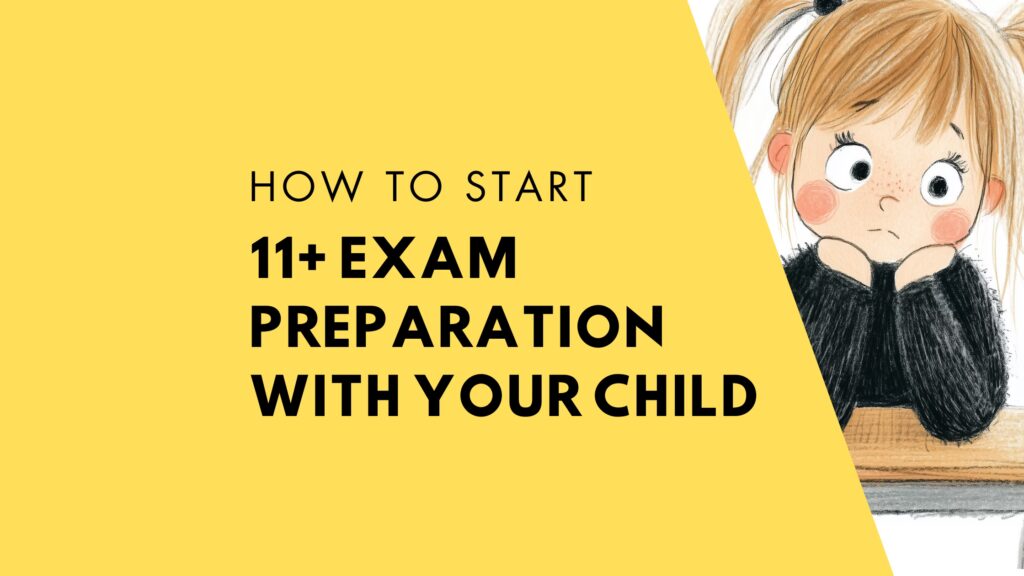Preparing your child for the 11+ exam can feel like a big task, but don’t worry—we’re in this together! Starting off on the right foot can help set you up for success. Let’s explore some straightforward tips on 11+ exam preparation to help you and your child embark on this journey with confidence and maybe even a bit of fun.

1. Getting to Know the 11+ Exam
First things first, let’s understand what the 11+ exam is all about.
The 11+ is an entrance test some schools use to select primary school pupils for admission to secondary schools. It usually covers subjects like English, math, verbal reasoning, and non-verbal reasoning. Before you make any decision on taking the 11+, you’ll need to research schools in your area to see if they are selective grammar schools. Not all UK counties offer a grammar school system. Many independent schools also use a similar format of exams. Since each school has different requirements, you must head to their website for more information. When applying to a private school, you may need extra prep work. Some will have additional entrance papers like creative writing. Note that some grammar school boards might have these additional requirements too.
If you’ve already found a school, then this stage of the process is really about getting to know the exam. Start by familiarising yourself and your child with the exam format. Some of the questions might seem daunting right now (it’s a challenging exam with some difficult questions!). But remember that your child has plenty of time to prepare and will still be learning at school and home. So don’t feel daunted by the task. Many parents have been in the same situation as you.
2. Research the Exam Board
Another critical point to note at this stage is that each educational authority has different 11+ assessments and exam boards. You’ll see terms. such as the GL assessment exams or CEM exams. Check which format is used where you are, as it will impact how you prepare for the exam.
At this stage of the process, you’ll also need to do your research about the pass mark. That’s what your child will need to achieve to win a grammar school place. This will differ depending on where your child sits on the exam. Often, it’s hard to get a completely definitive answer. But what you can do is head to some 11+ forums or Facebook groups. Ask parents what pass mark got their child into their chosen school.
3. What Is Your Child’s Ability?
Every child is unique. It’s essential to know your child’s strengths and areas where they might need a little extra help. You should already have a reasonable idea of how your child is performing academically. You’ll have their school reports, which will tell you how they are performing against key stage 2 in the National Curriculum. If you aren’t sure, speak to their teacher. Tell your child’s teacher you intend to apply to a grammar school. Ask for their honest opinion about whether your child is a good candidate. Remember that places are competitive. Your child doesn’t need to be a genius. However, they will need to be able to perform well in math and English exams. They’ll also need a solid foundation of academic knowledge. They must learn fast and be confident at taking a formal exam at a relatively young age. At some point in your preparation, you’ll need to practice non-academic stuff like exam techniques under timed conditions. Your child needs to feel confident enough to do that sort of practice.
4. Setting a Baseline
You should also consider doing a baseline assessment by getting your child to do a short mock paper for the 11+. There are lots of free practice papers online. Sometimes, you may even find some past papers.
You don’t need to worry about the score at this stage. It’s merely about figuring out where there might be gaps in their knowledge. For example, if you have a child in year 4, they are unlikely to have encountered some of the maths topics featured in the paper, like ratios, as these are usually covered in years 5 and 6 in primary school.
Always chat with your child and discuss their feelings about different subjects. Most children will generally excel more in either verbal reasoning skills or mathematical ability and find the other one more of a challenge (though occasionally, you do get a child that excels in both). But talking to your child will help you tailor the preparation to suit their needs perfectly.
You’ll also find that non-verbal reasoning questions are new to your child. They look like puzzles and are similar to IQ tests, often challenging kids on things like pattern recognition and problem-solving skills. Try and keep these puzzles fun for your children, because they can be.
5. Making a Study Plan Together
Creating a study schedule doesn’t have to be a chore. The trick is to make your child feel involved, so empower them by writing the plan together. Sit down with your child and plan manageable study sessions, including breaks and fun activities. You want to keep the study plan light and easy, especially at the beginning. If your child can only manage 5 or 10 minutes on exam papers on a Sunday afternoon, that is fine. Consistency is far more important than long hours of study.
Remember that your study plan should not just be about sitting at a desk and taking past papers. For example, the 11+ challenges children with a vast vocabulary, and there are some essential ways you can help your child build their vocabulary. Reading is the obvious one. Ensure they read novels that stretch them from different genres, and even get your child reading newspapers or non-fiction books. They could keep a dictionary and thesaurus to hand to look up any unfamiliar words. You can also order our Smarty Panthers specialist vocabulary workbooks, which feature word puzzles and mazes.
If you don’t feel confident helping your child with the 11+, perhaps because you have forgotten those topics from school, consider hiring a private tutor for additional support. Get some personal recommendations before choosing one. This may also be a good idea if you feel like you don’t have enough time to work with your child at home on their preparation.
6. Turning Learning into an Adventure for Effective Preparation
Who says studying can’t be fun? Incorporate games, quizzes, and interactive activities in between some practice tests to make learning enjoyable. Effective strategies can include flashcards, educational apps, our Smarty Panthers workbooks or even friendly competitions. Keeping the mood light can often be the best way to boost your child’s enthusiasm.
Make the environment fun, too. Run a study session in the park, with a picnic. Or head to the local cafe with a promise of cake or hot chocolate. If your child has a friend also taking the 11+, try doing a group study session to review some of the harder exam questions. It will help keep them motivated.
7. Keeping the Stress Away from Entrance Exams
Exams can be stressful, so it’s important to monitor your child’s well-being. Encourage open conversations about how your child is feeling and remind them that it’s okay to take breaks. Watch for common signs of stress, such as refusals to study, preoccupations with other activities, and changes to their eating habits. If you feel your child has become worried at the thought of exams, it’s often a good idea to take some time out of the study schedule to have fun instead. Book a trip to a safari park and ditch the exam papers for a few days.
It’s also important to celebrate small achievements along the way because children can often start to feel worried if they find the questions too difficult or if they keep getting questions wrong. Help your child by showing them how to look back on how far they have come and what they have done well rather than the negatives. It will help them build their confidence when they can start to give themselves a pat on the back for doing something well.
At some point in the journey, normally towards the end of your preparation, you will need to get your child to practise time management by doing some practice papers under timed conditions or by booking formal mock tests. Gradually make these timed conditions more stringent than doing this from the offset, as it’s a learned skill, and the first time your child does a timed paper, they might find it hard to work under pressure.
8. Plan a Reward
Children want to see rewards for their efforts. The same is true for adults! Planning a fun reward at the end of the exam day will help take the focus off the difficult stuff and get your child excited about something. Talk to your child about what they might like as a reward. You could even break it up into mini rewards to act as milestones each time they achieve something along the way.
Wrapping It Up: 11+ Exam Preparation Can Boost Your Child’s Odds of Success
Starting 11+ exam preparation is a team effort between you and your child. With understanding, planning, and a sprinkle of fun, you can make this journey a positive experience. Remember, the goal is not just to pass an exam but to support your child’s growth and love for learning. Good luck!
Pin This Post





